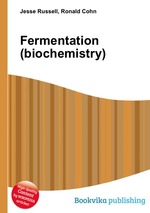Fermentation (biochemistry)
Jesse Russell Ronald Cohn
бумажная книга
High Quality Content by WIKIPEDIA articles! Fermentation is a form of anaerobic digestion that generates ATP by the oxidation of certain organic compounds, such as carbohydrates. Fermentation uses an endogenous, organic electron acceptor. In contrast, respiration is where electrons are donated to an exogenous electron acceptor, such as oxygen, via an electron transport chain. Fermentation is important in anaerobic conditions when there is no oxidative phosphorylation to maintain the production of ATP (adenosine triphosphate) by glycolysis. During fermentation, pyruvate is metabolized to various compounds. Homolactic fermentation is the production of lactic acid from pyruvate; alcoholic fermentation is the conversion of pyruvate into ethanol and carbon dioxide; and heterolactic fermentation is the production of lactic acid as well as other acids and alcohols. Fermentation does not necessarily have to be carried out in an anaerobic environment. For example, even in the presence of abundant oxygen, yeast cells greatly prefer fermentation to oxidative phosphorylation, as long as sugars are readily available for consumption (a phenomenon known as the Crabtree effect). The antibiotic activity of hops also inhibits aerobic metabolism in yeast.


